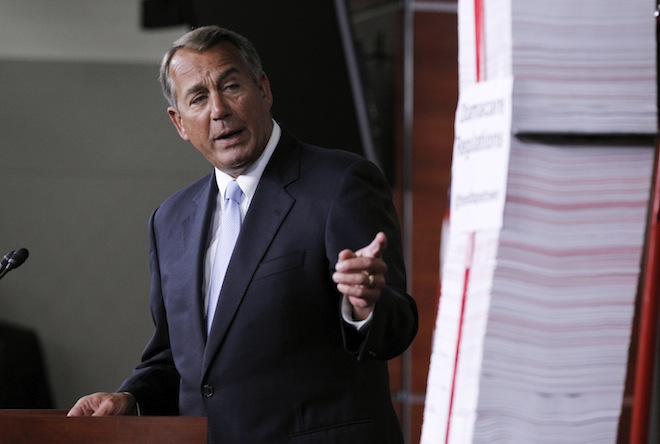Some influential conservative advocates are expressing initial skepticism about Speaker John Boehner’s gambit to squeeze Democrats by holding a vote to delay the Obamacare individual mandate for one year.
The Boehner plan — still under consideration — would try to force Democrats into the political position of supporting a reprieve for businesses from the employer mandate, which the administration has already delayed for one year, while opposing a reprieve for ordinary Americans from the individual mandate. The centrality of the individual mandate to the functioning of the law, unlike the relatively inconsequential employer mandate, means Democrats will have no choice but to block a bill to delay it.
But for the plan to work, Boehner must bring on board conservative congressmen who have previously scuttled similar measures by GOP leaders to put Democrats in uncomfortable political positions on Obamacare. Many conservatives see such efforts as a distraction from full repeal, which they believe the only acceptable Republican response to the law — even though that’s a fantasy with Democrats controlling the White House and Senate.
Conservative Erick Erickson, the editor of RedState.com and Fox News contributor, quickly called on Republicans to reject Boehner’s plan, in a blog post titled, “Hell No.”
“I am disappointed with John Boehner and the House GOP wanting to delay implementation of the individual mandate. I think Obamacare needs to go forward as designed by the Democrats,” he wrote.
“There can be no fixing. There can be no tweaking. There should be no delaying. … Republicans are under no obligation to mend what they were sent to Washington to end. Instead, let the American public see big government operate as Democrats designed it.”
Other conservative advocates also voiced varying degrees of skepticism toward Boehner’s plan and urged the GOP not to lose sight of the larger goal.
“The administration’s decision to delay the employer mandate gives congressional Republicans the opportunity to fight for a full defunding of the statute,” Dan Holler, a spokesman for Heritage Action, told TPM. “Delaying implementation of one section of the bill will not stop all the other sections from taking root. We need to keep our eyes on the ultimate objective.”
Michael Cannon, the health policy director of the libertarian Cato Institute, recognized a political upside to Boehner’s gambit for President Obama’s opponents. “Legislatively tying a one-year delay of the employer mandate to a one-year delay of the individual mandate highlights the corporatism, the lawlessness, and the unfairness of Obama’s unilateral repeal of the employer mandate for 2014,” he said in an email.
But he, too, argued the plan was flawed, and said Republicans must push for a one-year delay of the entire law, in part because of the administration’s separate decision to temporarily relax the subsidy-eligibility verification requirements for states running their exchanges.
“Boehner’s proposal does nothing to address the lawlessness and fiscal irresponsibility of that move,” Cannon said, concluding that President Obama’s actions “call for full repeal of the law, tied to the debt limit or HHS appropriations, or at a minimum a one-year delay of the entire law. … If employers get relief, every one does.”
Republicans may yet end up backing Boehner’s plan — lawmakers appear not to have spoken out about it yet. The plan carries a clear political upside for the party, which has supported efforts to repeal parts of the law such as the Independent Payment Advisory Board. But the doubts from outside conservatives who have demonstrable sway over GOP lawmakers suggests it’ll take some convincing to bring enough of them on board.
A House GOP leadership aide said the vote could potentially come as soon as next week. Responding to the conservative skepticism, the aide said, “The logic of this plan is pretty compelling. If you want to protect the American people from the President’s health care law, this is a strategy to put pressure on Washington Democrats and achieve that goal.”
In late April, activists persuaded conservative House Republicans to thwart a bill pushed by Majority Leader Eric Cantor (R-VA) to transfer funds from Obamacare’s prevention fund to the law’s temporary high-risk pool that covers people with preexisting conditions. Part of the aim was to improve the GOP’s credibility on the issue of helping sick people.
Boehner’s tentative plan, which he has discussed with members, is to hold a vote on legislation supporting the White House’s one-year delay of the employer mandate, and then immediately follow it up with a vote to also delay the individual mandate for a year.










